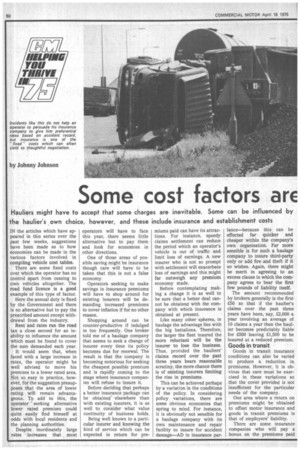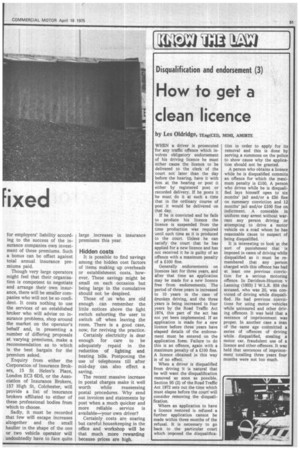Some cost factors are
Page 52

Page 53

If you've noticed an error in this article please click here to report it so we can fix it.
fixed
Hauliers might have to accept that some charges are inevitable. Some can be influenced by the haulier's own choice, however, and these include insurance and establishment costs
IN the articles which have appeared in this series over the past few weeks, suggestions have been made as to how economies can be made in the various factors involved in compiling vehicle cost tables.
There are some fixed costs over which the operator has no control apart from ceasing to own vehicles altogether. The road fund licence is a good example of this type of factor.
Here the annual duty is fixed by the Government and there is no alternative but to pay the prescribed amount except withdrawal from the industry.
Rent and rates run the road tax a close second for an inability to influence the amount which must be found to cover the sum demanded each year.
It would seem that, when faced with a large increase in rates, the operator might be well advised to move his premises to a lower rated area. Not so easy in practice, however, for the suggestion presupposes that the area of lower rating will remain advantageous. To add to this, the operator seeking alternative lower rated premises could quite easily find himself at odds with local residents and the planning authorities.
Despite inordinately large rates increases that most operators will have to face this year, there seems little alternative but to pay them and look for economies in other directions.
One of those areas of possible saving might be insurance though care will have to be taken that this is not a false economy.
Operators seeking to make savings in insurance premiums will have to shop around for existing insurers will be demanding increased premiums to cover inflation if for no other reason.
Shopping around can be counter-productive if indulged in too frequently. One broker told me of a haulage company that seems to seek a change of insurer every time its policy becomes due for renewal. The result is that the company is becoming notorious for seeking the cheapest possible premium and is rapidly coming to the stage where insurance companies will refuse to insure it.
Before deciding that perhaps a better insurance package can be obtained elsewhere than with existing insurers, it is as well to consider what value continuity of business holds.
Being well known to a particular insurer and knowing the kind of service which can be expected in return for pre miums paid can have its attractions. For instance, speedy claims settlement can reduce the period which an operator's vehicle is out of traffic and limit loss of earnings. A new insurer who is not so prompt with settlement will exacerbate loss of earnings and this might far outweigh any premium economy made.
Before contemplating making a change it is as well to be sure that a better deal cannot be obtained with the company with which insurance is obtained at present.
Like many other spheres, in haulage the advantage lies with the big battalions. Therefore, the larger the fleet insured the more reluctant will be the insurer to lose the business. Thus, provided the hauliers' claims record over the past three years bears reasonable scrutiny, the more chance there is of existing insurers limiting the rise in premiums.
This can be achieved perhaps by a variation in the conditions of the policy. In considering policy variations, there are some obvious economies •that spring to mind. For instance, it is obviously not sensible for a haulage company with its own maintenance and repair facility to insure for accident damage—AD in insurance par lance—because this can be effected far quicker and cheaper within the company's own organisation. Far more sensible is for such a haulage company to insure third-party only or add fire and theft if it so wishes. Again, there might be merit in agreeing to an excess clause in which the company agrees to bear the first few pounds of liability itself.
The amount recommended by brokers generally is the first £50 so that if the haulier's claims over the past three years have been, say, £2,000 a year involving •an average of 10 claims a year then the haulier becomes predictably liable for £500 leaving £1,500 to be insured at a reduced premium.
Goods in transit
Goods in transit insurance conditions can also be varied to produce a reduction in premiums. However, it is obvious that care must be exercised in these variations so that the cover provided is not insufficient for the particular needs of the company.
One area where a return on premiums might be obtained to offset motor insurance and goods in transit premiums is that of employers' liability.
There are some insurance companies who will pay a bonus on the premiums paid for employers' liability according to the success of the insurance companies own investment of these premiums. Such a bonus can be offset against total annual insurance premiums paid.
Though very large operators might feel that their organisation is competent to negotiate and arrange their own insurance, there will be smaller companies who will not be so confident. It costs nothing to use the services of an established broker who will advise on insurance problems, shop around the market on the operator's behalf and, in presenting a number of differing proposals at varying premiums, make a recommendation as to which is the best bargain for the premium asked.
Enquiry from either the Corporation of Insurance Brokers, 15 St Helen's Place, London EC3 6DS, or the Association of Insurance Brokers, 157 High St, Colchester, will provide a list of insurance brokers affiliated to either of these professional bodies from which to choose.
Sadly, it must be recorded that few will escape increases altogether and the small haulier in the shape of the one or two vehicle operator will undoubtedly have to face quite large increases in insurance premiums this year.
Hidden costs
It is possible to find savings among the hidden cost factors of items making up overheads or establishment costs, however. These savings might be small on each occasion but being large in the cumulative should not be despised.
Those of us who are old enough can remember the little notices above the light switch exhorting the user to switch off when leaving the room. There is a good case, now, for reviving the practice.
Certainly electricity is dear enough for care to be adequately repaid in the reduction of lighting and heating bills. Postponing the use of telephones till after mid-day can also effect a saving.
The recent massive increase in postal charges make it well worth while reassessing postal procedures. Why send out invoices and statements by post when a much quicker and more reliable . service is available—your own driver?
Certainly costs are soaring but careful housekeeping in the office and workshop will be that much more rewarding because prices are high.








































































































































